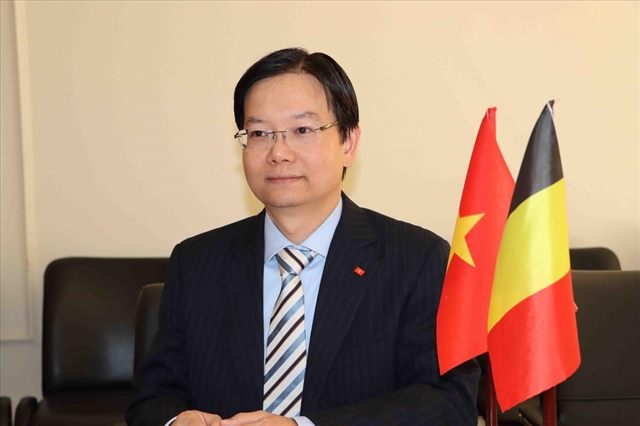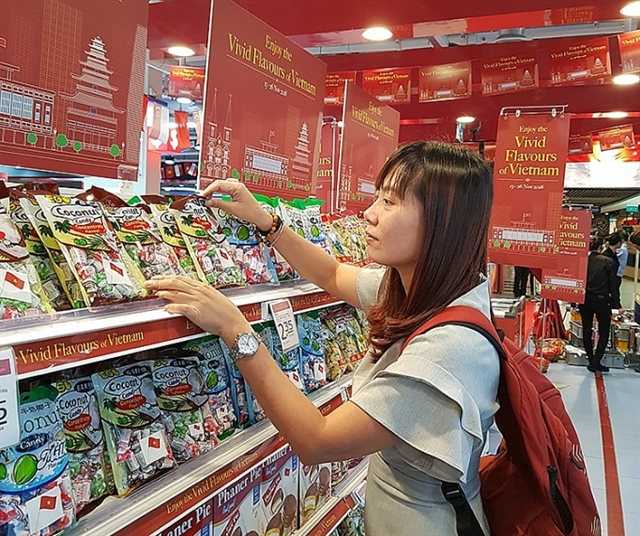 Economy
Economy

As the outbreak of the novel coronavirus (COVID-19) has become a global pandemic, Vietnamese firms must find an alternative to export their products as countries around the world tighten regulations to monitor trade flow.

|
| Customers shop for Vietnamese products at a supermarket in Singapore. — Photo congthuong.vn |
HÀ NỘI — As the outbreak of the novel coronavirus (COVID-19) has become a global pandemic, Vietnamese firms must find an alternative to export their products as countries around the world tighten regulations to monitor trade flow. Working together with large retailers and setting up shops online seem to hold the answers.
Traditionally a large exporter by volume, Việt Nam, however, has little to show for its collaboration with international retail and supermarket chains. A project initiated by the Ministry of Industry and Trade (MoIT) aims to address this issue by helping Vietnamese firms to connect with and participate in international distribution networks. The project, which was approved by Prime Minister Nguyễn Xuân Phúc, has been working closely with major retailers such as AEON, Auchan and Central Group, among others.
Tạ Hoàng Linh, head of the US, EU market department under the MoIT, said the project’s goal is to help Vietnamese firms gain a better understanding of international consumers’ demands, acquire modern management techniques and meet international retail standards.
It’s also an opportunity for retailers to work directly with Vietnamese firms to diversify supply sources and improve product quality, especially agricultural products which require rigorous monitoring to ensure consumer safety.
“This is a win-win situation as both sides can reduce business costs by eliminating the need for a middleman,” said Linh.
Trần Duy Đông, head of the domestic market department under the MoIT, said the SARS-CoV-2 outbreak had severely disrupted Việt Nam’s exports, especially agricultural products which put farmers in a vulnerable position in an increasingly volatile market.
Đông urged firms to work closely with farmers to strictly enforce quality standards and origin rules so that Vietnamese products could integrate in international retail chains and foreign markets.
A MoIT’s report showed retail chains could play an important role in helping Vietnamese products reach new markets.
For example, the Thai-owned MM Mega Market, formerly known as Metro Cash & Carry Việt Nam, has set up four major purchasing centres for agricultural products across Việt Nam. Last year, MM Mega Market exported over 1,000 tonnes of products.
Saigon Co.op and its partner NTUC FairPrice, a large supermarket chain based in Singapore, have been exporting hundreds of containers of agricultural products to the island city-state in recent years.
Notably, Japan's AEON Group and its TOPVALU brand are exporting Vietnamese goods worth up to a quarter of a billion dollars every year. The group has pledged to ramp up the export value of Vietnamese goods to one billion dollars in 2025.
According to trade experts, this was also an opportunity to ensure Vietnamese products meet international quality standards. However, as of right now only large firms with the required resources and infrastructure could take advantage of it.
Nguyễn Ngọc Luân, director of Lâm San Agricultural Co.op in the southern province of Đồng Nai, said access to the EU market had brought greater profit and stability. The co-op was now actively seeking new clients in the EU to work directly with them.
MoIT’s deputy minister Đỗ Thắng Hải said the ministry would continue to support Vietnamese firms by setting them up with large international retailers and e-commerce platforms. Overseas trade officials were told to stay in touch with domestic firms to keep them informed of new developments, demands and opportunities in foreign markets.
The ministry would also try to issue timely warnings and advisories to alarm Vietnamese firms of technical barriers and changes in regulations to help minimise risks. — VNS




